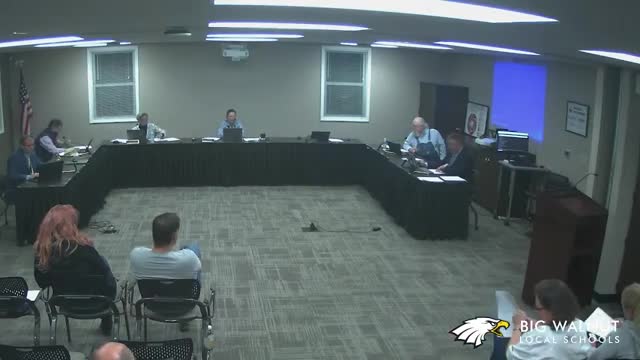Big Walnut board authorizes library bonds and bond refunding; transfer from general fund to debt retirement fails
Get AI-powered insights, summaries, and transcripts
Subscribe
Summary
The board approved a $19 million bond issue for the Sunbury community library and authorized a refunding (not to exceed $9,565,000) to realize debt-service savings; a proposal to transfer $3,026,730.65 from the general fund to debt retirement failed after debate about timing and pending state legislation.
The Big Walnut Local School District Board of Education voted Nov. 17 to authorize issuance of bonds not to exceed $19,000,000 to renovate and expand the Sunbury community library and to approve a separate refunding resolution for an amount not to exceed $9,565,000 to refinance portions of prior bond issues.
Treasurer Scott told the board the refunding is expected to achieve net present value savings (the discussion referenced a roughly 4.23% NPV figure) and noted the district can realize additional efficiencies by combining the library issuance and the refunding into a single financing transaction. Scott reported outstanding principal on prior refundings of about $13.1 million and said the financing team recommended moving while market conditions allow greater than the minimum targeted savings.
Board members voted by roll call to approve both the library bond authorization and the refunding resolution.
A separate motion to transfer up to $3,026,730.65 from the district general fund to the debt-retirement fund—intended to reduce property-tax levy rates for collection in 2026—failed. The measure drew extended discussion about stewardship of local tax dollars, the district’s unencumbered cash balance and uncertainty from pending state legislation affecting school funding. The roll-call vote was recorded with Mr. Crowell voting yes and Mr. Fuji, Mrs. Graziosi and Mrs. Nix voting no, and the motion failed.
Treasurer Scott had earlier described the district’s October position as fiscally strong: total revenues for the reporting period were roughly $32.68 million (a modest positive variance versus forecast), an ending general-fund cash balance of $35.94 million, encumbrances of $6.31 million and an unencumbered general-fund balance of about $29.63 million.
The board’s action on the bonds and the failed transfer both reflect short‑term decisions shaped by market timing and the board’s differing views on whether to use available cash to reduce levies now or hold reserves while potential state changes to property‑tax law are resolved. The board said it will continue monitoring pending legislation and county-level discussions that could materially affect revenue forecasts and capital planning.
